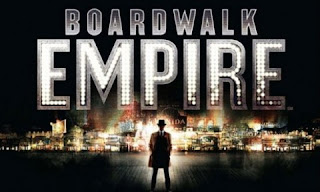All the way back in January 2011, guest writer Amanda ReCupido shared her take on the first season of HBO’s award-winning Boardwalk Empire. Since then, the post has been getting steady traffic, and currently stands as #8 in 2011.
________
 |
| HBO’s Boardwalk Empire |
With its first season complete and two Golden Globes under its belt (Best TV Drama and Best Actor in a TV Drama), Boardwalk Empire, HBO’s prohibition-era Sopranos/Mad Men hybrid, has gotten plenty of attention. And it’s something feminists should be paying attention to as well. Like Mad Men, the show doesn’t gloss over the sexist elements of the era, but instead exposes them in both stark contrast and comparison to how we view women in our society today.
The Peggy Olsen of the series is found in Margaret Schroeder (played brilliantly by Kelly Macdonald), who is wise beyond her era, yet remains limited by her gender. At the start of the series, we see her suffer physical abuse by her husband (so much so that she miscarries, and not for the first time). When she appeals to a wealthy politician (our protagonist Nucky Thompson, played by Steve Buscemi) to find work for her husband, he takes her under his wing, eliminating her abusive husband and setting her up with a job in a fancy dress shop. It is here that we encounter the division of class between the clientele and Margaret, an Irish immigrant whose boss assumes is uneducated and dirty (other ethnic and religious tensions abound in the turf wars between the Irish, Italian, and Greek mobs throughout the season). Soon Nucky takes a romantic interest in Margaret and offers to put her and her children up, though he won’t marry her. Margaret must weigh the costs/benefits of this situation (security for her and her children versus her neighbors thinking she’s a whore), but in the end she doesn’t have much of a choice, like most women in this show and of this era. But despite the boundaries around her, Margaret remains well-read, involved in local politics and with the Women’s Temperance Movement, and takes control of her sexuality (in the 1920s, birth control meant douching with Lysol). It is her struggle for both mere survival and to retain her honor in a time when the odds are against her that make her journey and triumphs so satisfying and enjoyable to watch.
See also: #10 in 2011 and #9 in 2011
